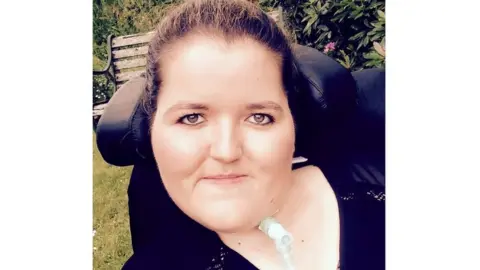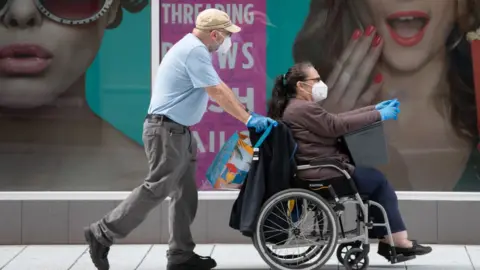Coronavirus: Why disabled people are calling for a Covid-19 inquiry
 Virginia Butcher
Virginia ButcherAs a disabled woman, Ginny Butcher is roughly 11 times more likely to die from coronavirus than her peers. New figures also suggest almost two-thirds of Covid-19 deaths in the UK have been disabled people. There are now calls for an inquiry.
Ginny is a 22-year-old wheelchair user who needs two personal assistants with her at all times. She is at high-risk of coronavirus and is still shielding at home.
She has a ventilated tracheotomy and says she's been "extremely anxious" during lockdown because there has been "zero guidance" on what to do if any of her assistants became ill or had to isolate.
She points to the impact of the Coronavirus Act - the emergency legislation the government passed at the beginning of lockdown - which took away significant parts of councils' duty to provide care for disabled people.
Critics said it gave councils - who previously had an obligation to provide certain care - the power to "downgrade" provisions for disabled and elderly people.
'We're being abandoned'
"Disabled women were left wondering how they were going to get out of bed in the morning," Ginny says. "With much less care, women were forced to venture outside to get groceries and other essentials, putting themselves at risk."
Those who do have care support have "struggled immensely" to get vital personal protective equipment (PPE), she adds, saying this puts both carers and disabled people at risk.
Ginny couldn't get any PPE for the first eight weeks of the crisis, despite being on the government's list of people who are clinically vulnerable to the virus.
"It has been my biggest concern throughout this crisis," she says.
It comes as the latest ONS figures, first reported by Disability News Service, showed more than 22,000 disabled people died from coronavirus, from 2 March to 15 May, making up two-thirds of all deaths.
The statistics suggest working-age disabled women like Ginny are more than 11 times more likely to die from coronavirus than their peers. For disabled men, the death rate was 6.5 times higher than non-disabled men.
"I'm not surprised at all", says Ginny. "Hardly anything has been done to protect disabled women. In fact, the opposite is true. Disabled women are being abandoned and left to die."
 Getty Images
Getty ImagesThe ONS analysis suggests that much of the disparity is caused by social and economic factors, such as "region, population density, area deprivation, household composition... and occupation".
Inequalities have been shown to disproportionately affect disabled people. But Chris Hatton, professor of public health and disability at Lancaster University, highlighted two key factors.
He says disabled women, and disabled people in general, are also more likely to have other health conditions that can increase their risk of dying from coronavirus. People with learning disabilities are disproportionately likely to be obese, have diabetes, or have kidney disease, he adds.
Crucially, he says people with learning disabilities often develop those conditions at a relatively young age, which could explain why the difference in death rates is particularly pronounced when it comes to young disabled women.
The second factor, Prof Hatton says, is that disabled people often have their health concerns overlooked and diagnoses are often delayed because new issues are assumed to relate to existing disabilities, rather than a new condition.
'We feel gaslighted'
Those same issues have spilled over into discrimination in coronavirus treatment.
At the end of March, the National Institute For Health and Clinical Excellence (Nice) published guidance which appeared to recommend prioritising coronavirus patients based on a "dependency" scale .
People who were highly dependent on others in their daily lives would be the first to be denied intensive care in the event that units became overwhelmed, regardless of whether they were clinically less likely to survive.
While hospital ICUs never exceeded capacity and the guidance was partially rescinded, Prof Hatton says it badly damaged confidence among disabled people.
"Medical professionals do not listen to disabled women, and often gaslight disabled women into thinking that they are not sick, unwell or in pain," Ginny adds.
"I'm not surprised that disabled women are failing to receive the medical treatment that they need."

- SOCIAL DISTANCING: What are the rules now?
- SYMPTOMS: What are they and how to guard against them?
- FACE MASKS: When should you wear one?
- TESTING: Who can get a test and how?
- SHIELDING: Who are most at risk?

Ginny says more needs to be done and disabled people's organisations agree.
"It feels like there has been a systemic failure to understand and address the needs of disabled people", says Mike Smith, a former commissioner of the Equalities and Human Rights Commission, who is now chief executive of disability charity Real.
He says an inquiry needs to look at all the "structural inequalities" disabled people face.
"All the way through this pandemic there has been a narrative to the wider population: don't worry, it only affects older people, and those with pre-existing conditions - as if, somehow, the value of those people's lives was less."
Leading charity Disability Rights UK agrees.
"We would want to know whether there are things that could have been done differently, such as earlier provision of PPE, earlier provision of testing, speedier diagnosis, access to critical care - as well as tackling increased isolation," says the charity's policy manager Fazilet Hadi.
A Department of Health and Social Care spokesperson said the government was "determined to take the right steps to protect" those who are most vulnerable to the disease and "minimise their risk".
"More than two million people have been identified as clinically extremely vulnerable and we have provided guidance to GPs and clinicians so they can add people to the shielded patient list, as they are best placed to advise on the needs of their individual patients."
The department said the care provisions implemented in the Coronavirus Act are only intended to be used when absolutely necessary and should be temporary.
There are no plans to extend shielding for extremely vulnerable people beyond the end of July but Public Health England continues to monitor the effects of the virus on different minority groups, the department said.
